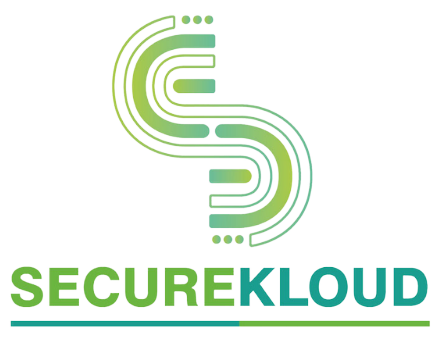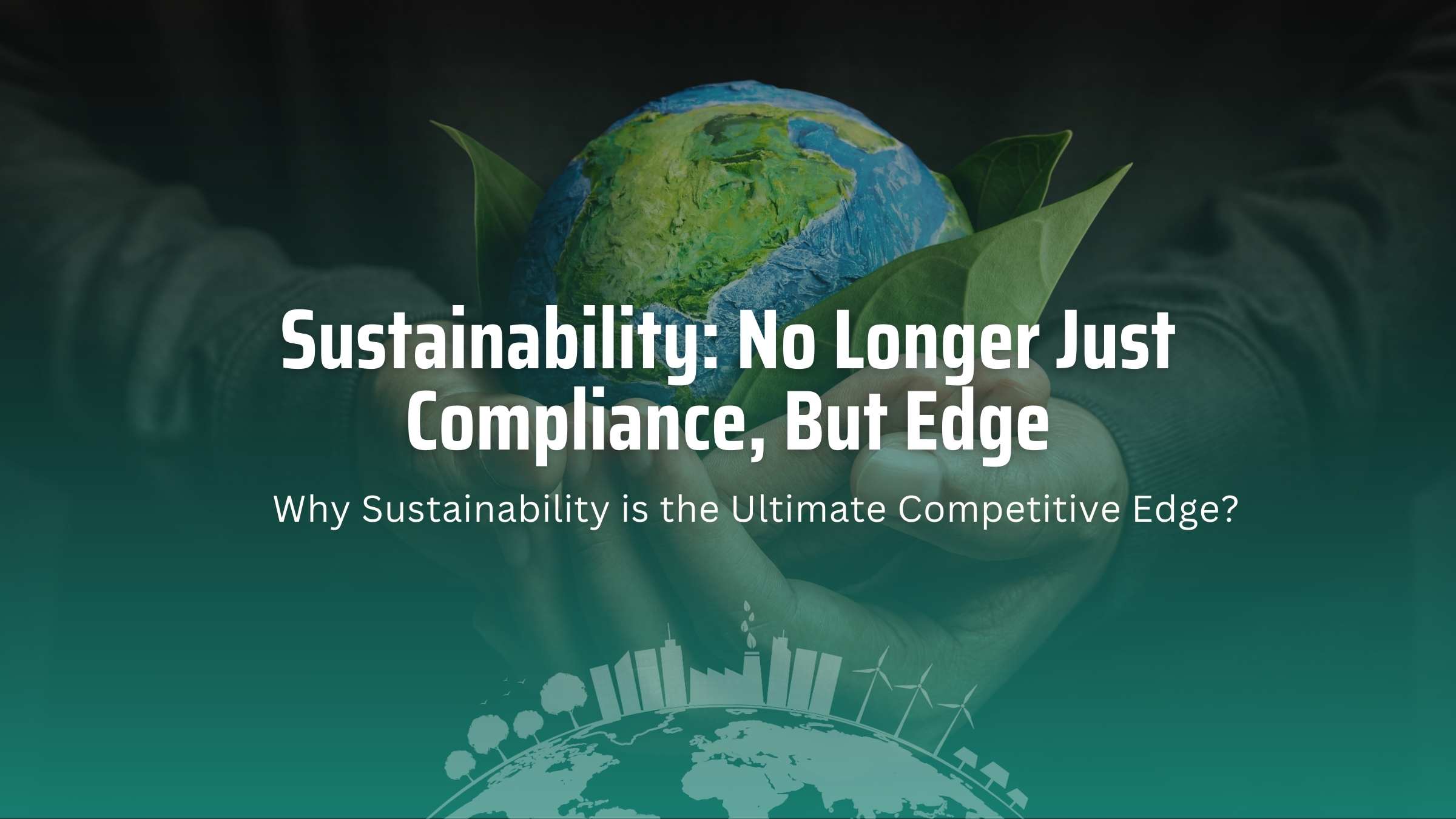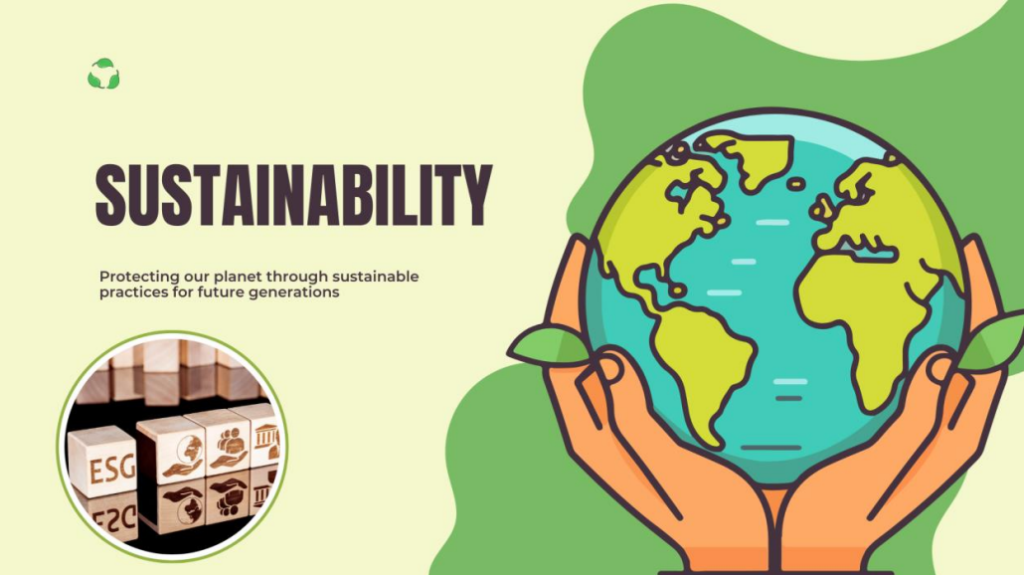
What if sustainability isn’t just about saving the planet, but about saving the future of business itself?
It’s a question more companies are starting to ask—and for good reason. Sustainability has moved beyond environmental activism and entered the boardroom as a serious strategy for long-term success. It’s no longer about if businesses should act but how fast they can adapt.
The world is at a tipping point. Climate change, resource depletion, and growing social inequalities are no longer distant threats—they’re realities affecting markets, supply chains, and bottom lines today. This is where sustainability steps in—not as a fluffy ideal but as a survival strategy. And no, it’s not just about hugging trees or swapping plastic straws for paper ones. It’s about making smarter choices today, so we don’t run out of options tomorrow. It’s about businesses thriving with the planet, not at the expense of it.
At its core, sustainability is about balance—meeting today’s needs without compromising the ability of future generations to meet theirs. But it’s not just about planting trees or reducing plastic waste. It’s a strategic approach that intertwines three powerful pillars:
- Environmental Sustainability – Protecting natural resources, cutting carbon emissions, and mitigating climate change.
- Social Sustainability – Ensuring ethical labor practices, community welfare, diversity, and human rights.
- Economic Sustainability – Building resilient, ethical businesses that fuel long-term growth without exploiting people or the planet.
This holistic approach doesn’t just help the environment—it creates stronger economies, healthier societies, and smarter businesses.
Global Movements Driving Change: Why Sustainability Is No Longer Optional
Sustainability has evolved from a corporate responsibility initiative into a business imperative, shaping global markets, supply chains, and investment strategies. No longer limited to environmental activism, sustainability now directly influences how companies operate, grow, and compete. As climate risks intensify and societal expectations shift, businesses, governments, and consumers are rallying around key global frameworks and standards to accelerate the transition to a greener, more resilient world.
These include the UN Sustainable Development Goals (SDGs), which provide a universal blueprint for addressing global challenges like poverty and climate change; the Global Reporting Initiative (GRI), a leading standard for sustainability reporting; and the Task Force on Climate-related Financial Disclosures (TCFD), which helps companies assess and disclose climate-related risks. Additionally, frameworks like the Science-Based Targets initiative (SBTi), CDP (Carbon Disclosure Project), ISO 14001 and many more for environmental management are driving corporate action on emissions reduction and resource efficiency. Together, these frameworks are not just shaping the future of business—they are redefining it, making sustainability a core driver of long-term success.
The Paris Climate Agreement: Humanity’s Pact for Survival
Signed by over 195 countries in 2015, the Paris Climate Agreement represents a global commitment to combat climate change. Its core mission? Keep global warming well below 2°C—and ideally 1.5°C—above pre-industrial levels. That seemingly small difference could determine the survival of entire ecosystems and communities.
The Paris Agreement isn’t just symbolic; it offers a concrete framework:
- Net Zero Goals: Countries commit to achieving carbon neutrality between 2050-2070.
- Transparency: Nations submit Nationally Determined Contributions (NDCs) to track progress.
India’s Role: in
- Net Zero by 2070 commitment.
- Aim for 500 GW of renewable energy by 2030.
The Paris Agreement is more than a treaty—it’s a global promise to future generations.
ESG: The New Blueprint for Business Success in a Sustainable World
While the Paris Agreement guides nations, ESG (Environmental, Social, Governance) has emerged as the gold standard for businesses, redefining success beyond profits to include measurable environmental and social impact. ESG is no longer a niche concept—it’s a core business strategy that influences everything from operations to investor relations, consumer trust, and regulatory compliance.
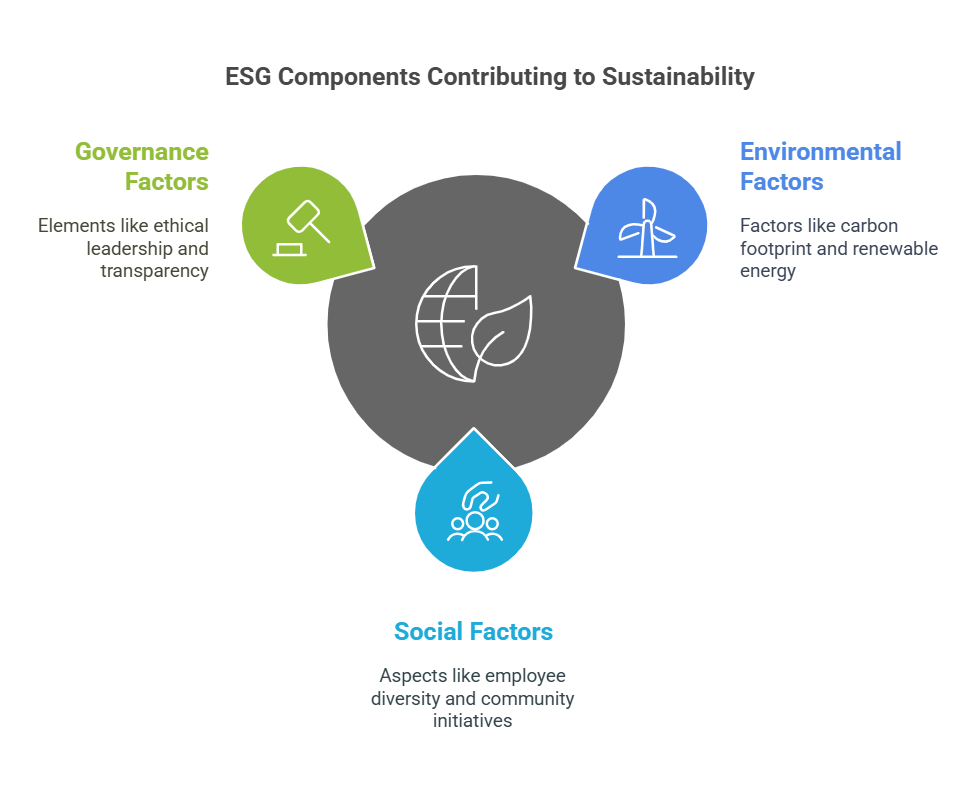
Breaking Down ESG
Social (S):
This pillar focuses on a company’s impact on the planet. Key areas include:
- Carbon Footprint Reduction: Companies are setting Net Zero targets and adopting renewable energy to cut emissions.
- Resource Efficiency: Innovations in water conservation, waste management, and circular economy models are reducing environmental strain.
- Climate Resilience: Businesses are preparing for physical risks like extreme weather and transitioning to low-carbon operations.
Social (S):
This pillar emphasizes a company’s impact on people—employees, communities, and consumers. Key areas include:
- Ethical Labor Practices: Ensuring fair wages, safe working conditions, and no child or forced labor.
- Diversity, Equity, and Inclusion (DEI): Building diverse teams and inclusive workplaces.
- Community Engagement: Supporting local development and addressing social inequalities.
Governance (G):
This pillar focuses on how a company is run. Key areas include:
- Ethical Leadership: Ensuring transparency, accountability, and anti-corruption policies.
- Board Diversity: Promoting gender and racial diversity in leadership roles.
- Stakeholder Engagement: Balancing the interests of shareholders, employees, and communities.
Global Trends Making Sustainability a Business Imperative
Sustainability is no longer a choice but a business imperative, driven by global trends that are reshaping industries, regulations, and consumer behaviour. Here are the key trends and regulations pushing businesses toward sustainable practices Global Trends Making Sustainability a Business Imperative
Key Global ESG & Sustainability Regulations
IN India:
- BRSR (Business Responsibility & Sustainability Reporting): Mandatory ESG disclosures for the top 1,000 listed companies.
- BRSR Core: Enforces detailed reporting on emissions, water use, waste management, and social policies.
EU European Union:
- CSRD (Corporate Sustainability Reporting Directive): Requires 50,000+ companies to report ESG impacts.
- CBAM (Carbon Border Adjustment Mechanism): Imposes carbon taxes on high-emission imports.
US United States:
- SEC Climate Disclosure Rule: Mandates ESG reporting for publicly traded companies, covering carbon risks and anti-greenwashing policies.
United Nations & COP Commitments
- Paris Agreement: Global warming cap of 1.5°C.
- COP29 (2024): Pushed for a stricter fossil fuel phase-out and renewable energy expansion.
Rise of ESG-Driven Investments:
Institutional investors now demand ESG transparency. Green bonds, sustainable loans, and impact investing are reshaping global finance, with ESG assets projected to reach $50 trillion by 2025.
Shifting Consumer Expectations
With 76% of consumers preferring eco-conscious brands, companies are rethinking sourcing, packaging, and supply chains to meet the demand for sustainable products and services.
Corporate Net Zero Commitments
Over 3,000 companies globally have pledged to achieve Net Zero by 2050, integrating carbon pricing and emission trading into their business models to align with global climate goals.
India’s Sustainability Revolution: Paving the Path to Net Zero and Global ESG Leadership
India is at a crucial stage in its sustainability journey, balancing economic growth with environmental responsibility. With ambitious goals like Net Zero by 2070 and the Viksit Bharat Mission 2047, India is driving a green transformation through renewable energy expansion, electrification of transport, and sustainable infrastructure.
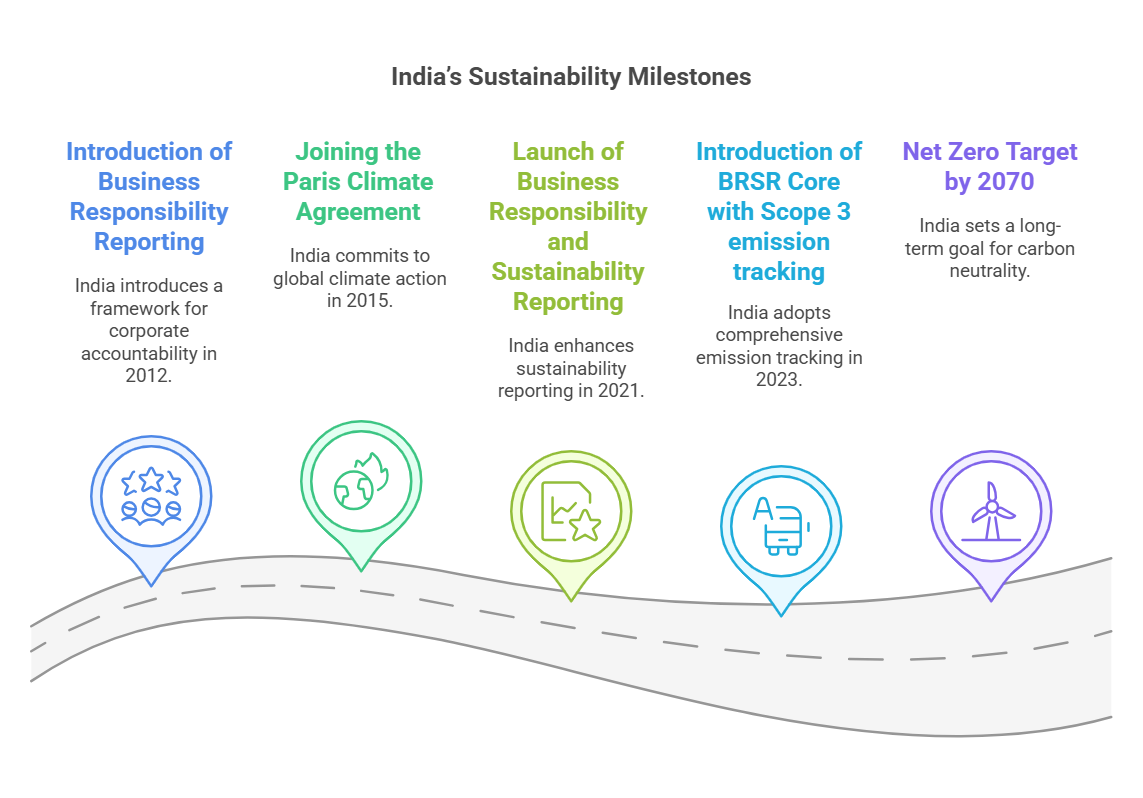
The evolution of ESG compliance has played a significant role, starting with voluntary Corporate Social Responsibility (CSR) reporting, followed by the introduction of Business Responsibility Reporting (BRR) in 2012. In 2021, BRR was replaced by the more comprehensive Business Responsibility and Sustainability Reporting (BRSR), mandating ESG disclosures for the top 1,000 listed companies.
The introduction of BRSR Core in 2023 further strengthened these requirements, demanding detailed Scope 3 emissions reporting and third-party validation. These frameworks have positioned India as a growing leader in sustainability, with businesses aligning their strategies to meet global standards and future-proof against stricter ESG regulations.
Conclusion: The Defining Edge of Tomorrow
Sustainability is no longer a “good-to-have”—it’s a “must-have.”
In a world where regulations are tightening, investors are demanding transparency, and consumers are making values-driven decisions, companies that prioritize sustainability aren’t just surviving—they’re leading.
The path forward is clear: adapt, innovate, and embed sustainability into the very fabric of business strategy. Those who act now will not only future-proof their operations but also unlock new opportunities, drive growth, and strengthen their market position.
The era of sustainability-driven business has already begun. The only question left is—are you ready to lead it?


